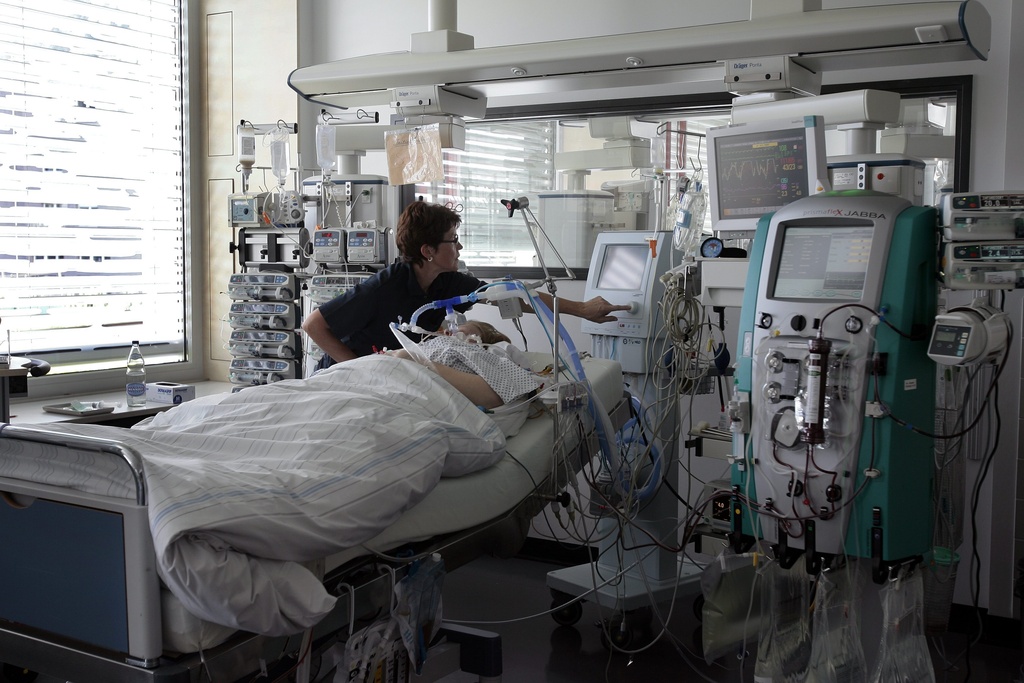Mental illness tests assisted suicide norms

A television documentary following the path to assisted suicide taken by a man suffering from bipolar disorder has focused debate on the practice for the mentally ill.
The documentary, “Tod nach Plan” (Death by Plan), which aired on Swiss-German television in early February, was echoed by the almost simultaneous screening of a documentary on Swiss-French television depicting a French writer with a non-mortal illness who travelled from France to Zurich to end her life.
A survey conducted last year by Zurich University found most Swiss are in favour of assisted suicide. The Federal Court recognises a person’s right to end their life on condition that they are of sound mind.
The practice of assisted suicide for people with terminal diseases such as cancer is by no means new in Switzerland. But cases involving the mentally ill, non-fatal but nonetheless debilitating diseases and the elderly, have polarised the debate around the questions of if, and how, the practice should be regulated.
Proposals to amend the penal code to restrict the practice of assisted suicide have dogged the federal government for more than ten years.
Key sticking points have been how or whether to define which kinds of illness should qualify a person for an assisted suicide, and how many medical opinions should be sought before a person can be given the green light.
Society’s role
While there is little question that mental illnesses such as bipolar disorder (formerly known as manic depression) and schizophrenia can be debilitating in the extreme and lead to great suffering, the obvious difference between such illnesses and terminal diseases like cancer is that they do not carry with them the certainty of death.
“The fact that it is a chronic illness is one thing, the fact that it is an incurable illness is another,” Panteleimon Giannakopoulos, head of mental health and psychiatry at the University Hospital of Geneva, told swissinfo.ch.
Giannakopoulos notes that psychiatric illnesses often manifest themselves over many years, during which the patient may suffer periods when they can have suicidal thoughts and periods of improvement when they are able to live a relatively normal life.
“It is clear that for these people we can treat them, we can improve their situation,” he said.
But such people can often become marginalised from society through factors such as loss of employment and friends as a result of their illness, said Giannakopoulos. He warns that a lack of regulation for such cases could lead to a “certain type of modern engineering”.
“These people are often in very good [physical] health but often they have few friends and are very solitary,” he said. “Do we take the point of view that we allow them, during a phase of resignation to say ‘well that’s it, I’ll finish it’? In an indirect way, it’s a risk, if we let the flood gates open, it’s a way of getting rid of these people.”
Who decides?
Lausanne-based psychiatrist and vice president of the Swiss Society for Psychiatry and Psychotherapy Pierre Vallon told swissinfo.ch patients with mental illness should not be allowed access to assisted suicide.
“It is not a doctor’s work to say if such an illness is incurable,” Vallon said. “We must be restrictive about these illnesses because they vary in intensity. How can you know precisely [if a patient has exhausted all options for treatment]?”
Giannakopoulos said patients with mental illness should have the same right to assisted suicide as patients with physical illness but said the difficulty lay in how to judge when an illness had passed the point of being able to be treated.
“This is where the parliament must be very precise although I am not sure it is that simple,” he said.
“What happens for the people who are psychological patients and for whom the handicap is not a physical handicap but is a psychological and social handicap? It’s going to depend on who will judge that and how we are going to judge the psychological handicap.”
Rare cases
President of Lausanne-based assisted suicide organisation Exit, Jérome Sobel, told swissinfo.ch cases when people end their life through assisted suicide remain uncommon.
His society, which has some 16,000 members in French-speaking Switzerland, last year helped 91 people to die. Cases involving mental illness are rarer still.
“Tod nach Plan” showed a physically fit 56-year-old André Rieder measuring out his weekly medications, saying goodbye to friends and family, and calmly talking a taxi to a non-descript building in Zurich where he ended his life.
Sobel defended the handling by sister organisation Swiss-German Exit of Rieder’s case as just and humane. He pointed to the patient’s 25-year illness during which he had been hospitalised almost 20 times, including periods spent in a closed psychiatric ward.
“He knew his illness well and did not want to suffer a new breakdown followed by a new hospitalisation. During a period when his condition was stable, he judged that for these reasons his life was no longer worth living,” said Sobel.
Sobel insists it is not for society to impose regulations on the treatability or not of such illnesses, and that a person suffering from a debilitating condition has the right to chose the circumstances of their death.
“These situations [involving mental illness] are extremely rare. They had verified that the society had given him all the treatment and support it should give to someone, but in the end life is not a prison,” said Sobel.
“It is something personal to each person. There is not an obligation to live if we chose to die.”
Swiss law tolerates assisted suicide when patients commit the act themselves and helpers have no vested interest in their death. Assisted suicide has been allowed in the country since the 1940s.
Assisted suicide is when a doctor provides a patient with the means to end his own life; however, a doctor does not administer the lethal substance.
Death is usually induced through a lethal dose of barbiturates that has been prescribed by a doctor. Ingestion of the poison, whether by drinking it or through the use of intravenous drips or stomach tubes, must be carried out by the person wanting to die.
A 2006 judgement by the Swiss Federal Court ruled that all people of sound judgement, irrespective of whether they suffer from a mental illness, have the right to decide the manner of their death.
A new proposal to amend the penal code to regulate assisted suicide practises is expected to be presented for consultation in June, but any plan is unlikely to be put before the parliament before mid-2012.
Switzerland has two main groups which cater to people who seek an assisted suicide, Exit and Dignitas.

In compliance with the JTI standards
More: SWI swissinfo.ch certified by the Journalism Trust Initiative














You can find an overview of ongoing debates with our journalists here . Please join us!
If you want to start a conversation about a topic raised in this article or want to report factual errors, email us at english@swissinfo.ch.